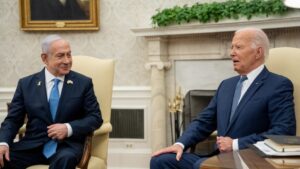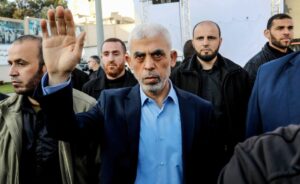Israeli military says it may have killed Hamas leader Yahya Sinwar | Hamas
Yahya Sinwar, the Hamas leader who masterminded the 7 October attack on Israel that triggered the war in Gaza, may have been killed, according to the Israeli military.
“During Israel Defense Forces (IDF) operations in the Gaza Strip, three terrorists were eliminated. The IDF [is] checking the possibility that one of the terrorists was Yahya Sinwar. At this stage, the identity of the terrorists cannot be confirmed,” a statement released on Thursday afternoon local time said.
“In the building where the terrorists were eliminated, there were no signs of the presence of hostages in the area. The forces that are operating in the area are continuing to operate with the required caution.”
Several security officials, speaking anonymously, told Israel media that the bodies had been taken to Israel for DNA tests, and that the IDF assesses “with high probability” that one of those killed was Sinwar.
Israel’s Kan Radio reported that the Hamas leader was killed “by chance”, and not as a result of intelligence gathering. The station also said the bodies were found with lots of cash and fake IDs.
It has long been believed that Sinwar had surrounded himself with Israeli hostages to lessen the likelihood of being killed. However, in a statement, the prime minister’s office said that no hostages were believed to have been present.
Sinwar considers himself an expert on Israel’s military and politics. He speaks perfect Hebrew, learned during more than 20 years in prison, and is widely believed to have been the driving force behind Hamas’s strategy of the last few years: to lull Israel into thinking the group had been deterred from fighting Israel, before launching the surprise attack in which 1,200 people were killed and another 250 taken hostage.
Various western and Israeli intelligence assessments over the past year suggested that Sinwar has long shunned electronic communication, relying on a network of couriers to communicate with the outside world from Hamas’s vast network of tunnels beneath the Gaza Strip.
Those reports also said Sinwar had become “fatalistic” over a year of intense warfare in which 42,000 people have been killed, believing he would die, but still hoping to ensnare Israel in a regional battle with Iran and allied groups around the Middle East such as Lebanon’s Hezbollah.
Sinwar, 61, was born in the Khan Younis refugee camp in southern Gaza. Among his childhood friends were Mohammed Deif, Hamas’s military chief, whom Israel claimed to have killed in an airstrike three months ago, and Mohammed Dahlan, an influential member of the secular Fatah party now living in exile in the UAE.
He joined Hamas at an early age, spending much of his youth in and out of Israeli prison. He rose through the ranks as an infamous enforcer, in charge of finding and killing suspected Palestinian collaborators with Israel.
In 1989, he was sentenced to four life sentences for the abduction and killing of two Israeli soldiers and four Palestinians he suspected of collaboration. He served 22 years before being released in the 2011 prisoner exchange in which Israeli soldier Gilad Shalit was returned for 1,000 Palestinians.
He was elected by other Hamas members in a secret ballot as Hamas’s chief in Gaza in 2017, surviving several Israel assassination attempts.
In a sign of the group’s hardening position on ceasefire talks, Sinwar was appointed as head of the group overall after Israel’s assassination of Hamas’s Qatar-based political chief, Ismail Haniyeh, in July.
#Israeli #military #killed #Hamas #leader #Yahya #Sinwar #Hamas
News plays a pivotal role in our lives by keeping us informed and connected to the world. It serves as a critical source of information, offering updates on current events, politics, economics, science, and more. Through news, we gain awareness of global issues and local developments, helping us make informed decisions in our personal and professional lives. News also fosters discussion and debate, encouraging critical thinking and perspective-taking. Moreover, it promotes transparency and accountability among governments, businesses, and other institutions. In a rapidly changing world, staying updated with the news enables us to adapt to new challenges and opportunities, shaping our understanding of the complexities of society. Ultimately, news is not just about information; it empowers us to participate actively in the world around us, contributing to a more informed, engaged, and responsible global citizenry.
Health is fundamental to our well-being and quality of life, making it an essential aspect of daily existence. It encompasses physical, mental, and emotional aspects, influencing our ability to function effectively and enjoy life fully. Prioritizing health allows individuals to maintain optimal physical fitness, reducing the risk of diseases and promoting longevity. Mental health, equally crucial, affects our cognitive abilities, emotional stability, and overall happiness. Investing in preventive healthcare through exercise, balanced nutrition, and regular medical check-ups helps in early detection of potential health issues, ensuring timely intervention and treatment. Beyond individual benefits, a population’s health impacts societal productivity and economic stability. Governments and organizations worldwide emphasize public health initiatives to address pandemics, health disparities, and promote overall well-being. Ultimately, health serves as the foundation upon which we build our lives, influencing our ability to pursue goals, nurture relationships, and contribute meaningfully to society.
Money plays a crucial role in our lives as a means of financial security and freedom. It enables us to meet basic needs such as food, shelter, and healthcare, while also providing opportunities for education, travel, and personal growth. Beyond material comforts, money facilitates social connections and experiences that enrich our lives. It empowers individuals to invest in their futures, whether through savings, investments, or entrepreneurial ventures, thereby fostering economic stability and growth. However, the pursuit of wealth should also be balanced with ethical considerations, as money can influence relationships and societal dynamics. Responsible management of finances is key to achieving long-term goals and mitigating financial stress. Ultimately, while money is a tool for achieving aspirations and fulfilling desires, its true value lies in how it is utilized to improve both personal well-being and the broader community.
Earning Easy Money in 2024: Opportunities and Considerations 💸
In 2024, the landscape of earning easy money presents diverse opportunities, albeit with considerations. The digital age offers platforms for freelancing, online trading, and e-commerce, allowing individuals to leverage skills and creativity for financial gain. Cryptocurrency investments continue to allure with potential for quick profits, yet they entail high volatility and risk. Moreover, the rise of the gig economy enables flexible work arrangements through apps and websites, offering quick payouts but often without job security or benefits. Passive income streams such as rental properties and investments in stocks or bonds remain viable, but demand initial capital and ongoing management. Amid these options, caution is essential to avoid scams and unsustainable ventures promising overnight success. Ultimately, while the allure of easy money persists, informed decisions, diligence, and a long-term perspective are crucial for sustainable financial growth and security in the dynamic year ahead.





